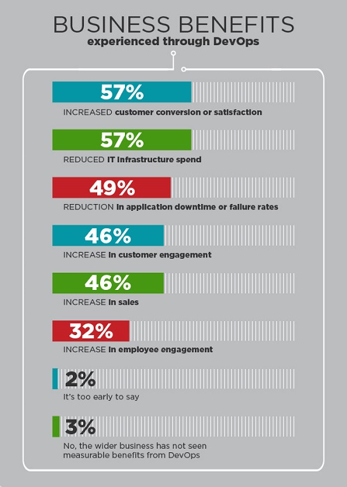According to a global DevOps survey conducted by Rackspace, DevOps adoption is becoming more widespread and companies are beginning to see real and measurable business benefits from doing DevOps. However, resistance to establishing a new practice is to be expected. This article examines how to get companywide buy-in and get started on the road to DevOps.
There are many common definitions of DevOps, but at its core, DevOps is about breaking down the wall that has risen between developers and the operations team and creating an environment in which these teams can work together to innovate faster. DevOps has been gaining momentum across the industry, but the Rackspace Global DevOps Adoption Study shows that companies are adopting or considering adopting DevOps at rates greater than you might expect.
Of the seven hundred businesses that participated in the study, 55 percent have adopted DevOps approaches, and an additional 31 percent are planning to in 2015. Looking at only US respondents, the number currently using DevOps practices grows to 66 percent. As a result, as shown in the DevOps Adoption Infographic, these businesses are seeing increases in customer satisfaction (57 percent), customer engagement (46 percent), and sales (46 percent). Businesses understand, and are beginning to exploit, the process path in terms of how DevOps can deliver value to customers—and therefore the overall business—through technology.

Leading Your Company Down the DevOps Path
If you are thinking that a move to a DevOps methodology is the right path for your business, understand that it isn’t something you accomplish overnight. To practice DevOps, you embark on a journey populated by an unfamiliar way of doing things. People resist DevOps the way they might resist any change—because the familiar is comfortable and not fraught with risks.
Any successful person knows you can’t make progress without taking some risks. But, according to Jeff Hackert, director of engineering development at Chef (formerly of Riot Games), whom Rackspace interviewed for the e-book The DevOps Mindset: Real-World Insights from Tech Leaders, resistance is to be expected. After all, Hackert says, “we’re replacing an established value proposition with a new one that is seemingly untested.”
Although uniting employees behind the common goal of serving the customer can be a powerful catalyst to improve collaborations and efficiencies, not everyone will acknowledge the progress to be made through DevOps practices. Resistance from the IT operations team (42 percent) or from developers (32 percent) topped the list of drawbacks experienced through DevOps implementations in the Rackspace survey. Taking a hard look at your internal processes and making changes first to how teams think and approach problems ultimately can help your teams move down that path more easily, and eventually, maybe more willingly, too.
To make such changes, you’ll need companywide buy-in that won’t get traction without support from the top down. Jim Kimball, CTO at HedgeServ, acknowledged the need for that support in The DevOps Mindset and said he is grateful that he has a “team of leaders who are willing to try things with me. Together we have worked with our teams to ease people along the path.” Though effective leadership is necessary for DevOps (and, obviously, for any business-related endeavor) to be successful, the catalyst for change doesn’t necessarily start at the top.
The survey shows that although the CIO is the primary driver for bringing DevOps to an organization 28 percent of the time (the CTO, just 6 percent), the IT operations team is responsible for pushing the change 45 percent of the time—a number barely larger than the percentage of IT ops teams who are resistant to DevOps (42 percent). This is a reflection of the significant change and demands that the system administrators are currently experiencing in modern companies.
As cloud adoption increases across tech-centric companies, system administrators are responsible for balancing a demanding set of constraints: size, complexity, speed, stability, and reliability. Although these changes come with a sense of inevitability, there are various levels of DevOps acceptance by system administrators—primarily due to the significant skill set changes that are required to truly be effective in a cloud era. Some are leading the charge into this “new world,” while others will be slower to adapt.
In-House Services versus Outsourcing
In addition toresistant individuals or teams, there are other barriers to DevOps. Not having the right tools and infrastructure in place proved problematic for 18 percent of survey respondents. Not having the right skill sets in-house was a problem for 22 percent. How do you test and choose which tools are best? How do you determine which skill sets are needed? Maybe you want to get started with DevOps, but you’re struggling to find answers to questions like these and, like 26 percent of survey respondents, you’re unsure of what DevOps entails, exactly.
DevOps service consultants can provide guidance on how and where to begin with DevOps. Of organizations that outsource DevOps services, 61 percent say outsourcing is more cost-effective, and 55 percent acknowledged that outsourcing enables the organization to focus on innovation. Outsourcing can be a win-win for businesses—they get the DevOps services and the accompanying benefits without spending additional time and money on hiring and training in-house staff, realigning teams, and redefining internal processes.
Whether you implement DevOps practices with in-house staff or choose to outsource DevOps talent and help, combining the efforts of developers and the operations team and inciting true collaboration that leads to rapid innovation, accelerated times to market through reduced cycle times, higher deployment quality, and increased efficiency can produce measurable business benefits and improved satisfaction—for both your customers and your employees.

